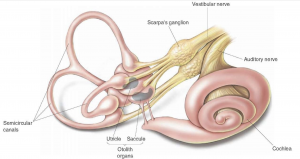picture credit: https://s3.amazonaws.com/lowres.cartoonstock.com/animals-bat-blood-head_rush-orthostatic_hypotension-orthostasis-mgrn647_low.jpg)
There could be a number of reasons why you feel dizzy every time you stand up, but let’s talk about the why, the how, and the what-you-should-dos.
What Is Dizziness?
Dizziness is a sensation of lightheadedness or feeling unsteady. It could be felt in sitting, standing, lying down, walking, or after a roller coaster ride or sitting at the front row of the movies. It is fairly unpleasant, but the source of the dizziness can help determine how bad it can be.

Where Can It Come From?
Most cases of dizziness have some physiological origin. Some are related to what position you are in or changing to (such as standing). Here’s the most common sources of dizziness
Dehydration
This is a big one. Have you ever gone the whole day without water? If you are like me, you don’t have a great thirst mechanism to remind you to drink water. Consequently, headaches and dizziness may creep up unexpectedly. Keep in mind that dehydration isn’t just from lack of water, but can be caused by excessive heat as well. These hot Indian summers can cause you to sweat more than usual, and you may be losing more water than you consuming.
Think about it this way, if your circulatory system was the equivalent of water flowing through a garden hose, then being dehydrated is basically honey trying to flow through that same hose. Much less efficient. And much tougher on the body. So instead of a healthy circulatory flow, your blood becomes more viscous and your blood pressure rises. If adequate blood flow can’t reach your vital organs such as your brain, then (at worst case scenario), you may be at risk of an ischemic stroke (lack of blood supply to the brain causing paresis and neurological dysfunction). But one of the first signs is headaches, dizziness, and lightheadedness. Always be on the alert!
Heat Stroke / Excessive Sweating
Your body will try to adapt to the external stresses imposed upon itself. When it’s hot outside, you will perspire as a means of cooling down. When you exercise, your heart and muscles work vigorously, creating energy as an output that expels heat through the body via homeostasis and sweating. In summation, losing water via sweating and perspiration relates back dehydration. If you aren’t replenishing with water or electrolytes, you may be at risk of increasing dizziness while standing, sitting, or even lying down.
Vertigo and Vestibular Dysfunction

Your inner ear functions to keep you oriented and steady. There are cells in your brain and spinal cord that relay sensory input to keep you oriented and stable. Imagine if every time you drive in your car, your brain has to consciously correct for the fast-moving periphery. You’ll get very dizzy, very fast. It’s why a roller coaster (which is fast movement and fast visual stimuli, causes some to feel woozy afterwards). Instead, your vestibular system and your reflexes account for these stimuli autonomously. Other neurological symptoms can alter your steadiness, such as diplopia (double vision), ataxia (unsteady, uncontrolled movements), and general weakness.
Orthostatic Hypotension and Low Blood Sugar
We often think of high blood pressure as a huge problem and a risk factor for stroke. But it’s often underlooked how low blood pressure can be a serious problem as well. Hemoglobins in your blood carry the oxygen you breathe in. The oxygen fuels your vital organ cells for daily function (your heart, lungs, kidneys, muscles, etc.). If your circulatory system is not efficient in pumping blood to your vital organs, they can starve. And for a brief moment, you can have a lapse of dizziness or syncope (the sensation of fainting). Fortunately for most, your autonomic nervous system will detect this sudden drop in blood pressure and try to self-correct it within a minute or two.
For those who have diabetes or thyroid conditions, they may be at risk of low blood sugar. A common sign of low blood sugar involves dizziness and fainting, and may necessitate eating a snack (crackers or consuming apple juice) as a means to maintain their composure.
Alcohol
If you put undue stress on any of your organ systems, there’s bound to be a response. Cause and effect is seen when alcohol enters your bloodstream and affects your vestibular function (inner ear). As a result, the room starts to feel like it’s spinning. Your eyes may be constantly shifting to correct for the moving stimuli. Nausea and vomiting may follow. Alcohol in light amounts don’t usually cause this extreme of a reaction (1-2 drinks), however moderate to severe amounts can really disrupt your vestibular function.
Polypharmacy

Polypharmacy refers to the taking of multiple medications, either prescribed or over the counter, ranging anywhere from 2-9 different medications per day. According to this article by Rushabh et al, the interactions of these drugs can cause adverse side effects such as decreased alertness, weakness, tremors, hallucinations, and of course, dizziness. Someone who is both diabetic and hypertensive may be taking different medications to address both, and may be more susceptive to ADRs (adverse drug reactions).
What Can You Do About It?
Dizziness while standing up is usually caused by a sudden change in position (lying down to standing right away), or lacking food and water. Sometimes the easiest solution is modifying your habits (getting up slowly/cautiously, and remembering to eat and drink adequate amounts each day). But there are special circumstances where it may be more serious than that. Try this algorithm here:
Step 1
Ask yourself if you’ve had the recommended 8 cups of water today. If not, down a full glass right now! Gatorade (which contains electrolytes) are a great option as well! If you have trouble reminding yourself to drink water like I do, invest in a camelbak or Nalgene, fill it up before you leave for work, and keep it on your desk. It’s a great reminder.

Step 2
Ask yourself the red flags
Is there ringing in the ears?
Is there chest pain of any kind?
Is the dizziness worsening? Has it been longer than 3 days?
Any associated headaches?
Any unexpected buckling when you are walking?
Any new changes in weight loss or bowel/bladder?
Are you taking more than 2 different medications?
Answering yes to any of the above may necessitate a visit to your doctor.
Step 3
Control what you can. The amount of alcohol we consume, the amount of water we drink, the amount of sleep we get. We understand when the dizziness may be out of your control (no pun intended), but let’s not let the reason be that we are a dehydrated zombie who slept for 3 hours after a night of drinking beers with the boys.
Step 4
Know who can help! A physical therapist is a great resource. If we determine dizziness to be related to migraines, neck pain, postural issues, or vertigo, we have the tools to fix it! We are capable of determining the presence of BPPV and employing the correct treatment. For example, the Epley Maneuver can be used to treat positional vertigo (93.4% success rate!!), but bear in mind, don’t be Google MD! There are various types of vertigo out there (Meniere’s, Acoustic neuromas, polyneuritis, etc), and the type needs to be determined before trying any solutions!
Last Words...
Dizziness coupled with poor balance is a recipe for disaster. For some, people can still maintain their balance when dizzy or inebriated, and for others, not so much (insert gif of drunken female). If you are on the spectrum of feeling like your balance can use some improvement, come join us for our weekly Better Balance Workshop at Sausalito Fitness Club! They are every Monday (6pm) and Wednesday 12 (pm).
Again, control what you can, and for what you cant.. Get the right help!


Educators at Mayo Clinic train tomorrow’s leaders to deliver compassionate, high-value, safe patient care. Orthostatic hypotension also called postural hypotension is a form of low blood pressure that happens when you stand up from sitting or lying down. Orthostatic hypotension can make you feel dizzy or lightheaded, and maybe even faint.
Thanks Daniel, you are correct. If you change positions quickly (i.e. lying down to sitting up), it is best to wait for any dizziness to subside before taking your first steps. This can take a couple minutes.